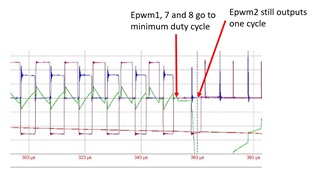Other Parts Discussed in Thread: SYSCONFIG
unexpected pulse at epwm2.
The configuration that we have done is:
Epwm1 is the master of epwm2, 7 and 8
All work with phase 0
Their periods are all sync with TBPRDLINK.
GLDMODE is done when the counter reaches Z(0).
All are configured in one shot mode OSHTMODE=1
We change the pwm CMPA and CMPB registers dynamically from a CLA task synchronized with the period of the pwm
we have observed that occasionally, when changing from a certain on time (something like 40% duty cycle) to a very low value (t1_cnts and t2_cnts lower than the deadtime), epwm2 takes one extra cycle to output that value, while all other modules do it immediately.


